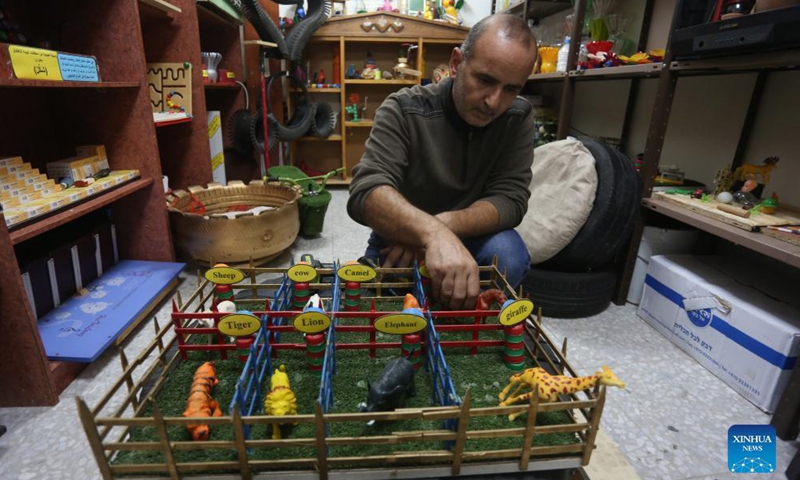
Ayman Abed Rabu works on waste recycling at his house in the West Bank city of Nablus on Oct. 19, 2021. For many years, Ayman Abed Rabu, a Palestinian man from the West Bank city of Nablus, has been doing his best to create a culture of waste recycling among the residents of his region.Photo:Xinhua
For many years, Ayman Abed Rabu, a Palestinian man from the West Bank city of Nablus, has been doing his best to create a culture of waste recycling among the residents of his region.
The West Bank is suffering from an acute garbage issue. According to a 2018 report by the Palestinian Central Bureau of Statistics, the average household waste in the West Bank stands at 1,835 tonnes a day. About 80 percent of the garbage is organic waste, while 20 percent is solid.
The 46-year-old man believes that the population can reduce their garbage by adopting a waste recycling culture. He decided to move from one place to another to implement his workshops for free, aiming at teaching people on how to recycle waste.
The middle-aged man told Xinhua that he felt sad when he saw the garbage scattered around the streets of the West Bank. "This means that citizens will be exposed to diseases and that our environment will remain polluted," he said.
"We cannot force people to clean the streets. However, we can encourage them to reduce their household waste by recycling those things that would be re-used," he said.
Taking matters into his own hands, he started to recycle the garbage of his own household 11 years ago.
Initially, he recycled solid waste, mainly plastic, turning it into dolls for his kids and taught them how to recycle waste.
"After several months, my two-room house became an exhibition of the recycled products," the man recalled, saying that "I made antiques, vases, and many baby dolls, plus I was able to turn organic waste into compost that I use in my garden."
He said that he was happy when most of his guests asked him how he did that and they were excited to follow up his steps and recycle their own waste too.
In a bid to spread his idea, the man invited his friends, relatives and neighbors to attend the training sessions he implemented in his spacious garden and show them the basic methods of recycling operations.
"It is not hard; we only need simple tools and most of them are available in our houses such as scissors, adhesives, some cardboard or watercolors in case we want to make beautiful dolls or figures," he said.
Yet, his initiative was not to stop there, and the man, who is working at the ministry of environment, started to set up hundreds of workshops for school students and teachers.
"We should raise a new generation that is interested in keeping our environment clean, healthy, and safe," the man said.
He teaches students and their teachers how to recycle damaged car tiers and turn them into furniture for schoolyards or even recycle them into pots for farming.
In addition, he teaches them how they can recycle paper waste and turn it into beautiful figures and statues.
To spread his idea, he asked his trainees to teach their friends and relatives and expand the circle of people who are recycling waste.
Rady al-Qawasmy, a teacher at a government school in Hebron city, south of the West Bank, was one of those who were taught by Abed Rabu on how he could recycle his class waste, especially paper.
The 36-year-old father of two, said that he and his students became aware of the benefits of waste recycling after turning his schoolyard into "a beautiful place."
"I adopt the culture of waste recycling in my house too. The population density is increasing dramatically in the West Bank, which means that the amount of garbage is also increasing, so we have to adopt the idea of reducing it as much as possible."
Dian Jamal, a housewife from Ramallah city, has also adopted the waste recycling culture in her house to reduce household waste.
The 40-year-old mother of six told Xinhua that the family is the basis of society, so the spread of the culture of recycling among Palestinian families means that the garbage will be reduced and the environment will become cleaner and safer.
Abed Rabu expressed his happiness as he has succeeded in making a positive impact on his community.
He will open an eco-friendly park in his house yard to the public to enjoy their time inside it in the upcoming days.
He made all the furniture from recycled waste, especially solid waste, while the organic garbage will be turned into compost for farming.
